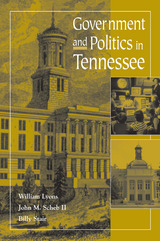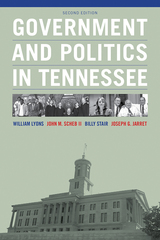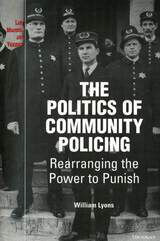
This book places Tennessee’s modern political institutions in the context of the history and personalities that formed them. They pay special attention to the period after 1978, when three governors left a lasting impression on the direction and culture of the state government. Separate chapters examine the legislative, executive, and judicial branches, explaining how and why Tennessee’s political culture differs from other states. The book also explores the ways in which education, health care, corrections, and economic development define much of the government agenda. Additional chapters on the media, political campaigns, and local government provide a backdrop that elucidates more fully how the state government functions.
The authors profile many of the personalities who have shaped the state’s political agenda. Among these are longtime Senate Democratic Speaker John Wilder; his close ally, Senate Republican Leader Ben Atchley; House Speaker Jimmy Naifeh, son of a Lebanese immigrant; and Bill Snodgrass, who served as State Comptroller for forty-seven years. The book explains how each of these individuals related to three Tennessee governors, Republicans Lamar Alexander and Don Sundquist and Democrat Ned McWherter, whose administrations presided over the state’s greatest period of growth and prosperity.
Illustrated with photographs and tables, and featuring anecdotal sidebars that illuminate key issues, this book will become the standard text on Tennessee state government and politics for years to come.
The Authors: William Lyons is a professor of political science at the University of Tennessee and coauthor of such books as American Government: Politics and Political Culture.
John M. Scheb II is a professor of political science and director of the Social Science Research Institute at the University of Tennessee and coauthor of American Constitutional Law, among other books. In partnership with Dr. Lyons, he provides campaign consulting for political candidates and applied survey research for businesses and organizations.
Billy Stair is director of communication and community outreach at Oak Ridge National Laboratory. He served for eighteen years in the legislative and executive branches of state government, including eight years as senior policy advisor to the Governor.

Most Americans are more aware of the workings of the federal government than of their own state governments. But these “laboratories of democracy” constitute perhaps the most creative components of the American political experiment.
This book serves as a guide for students of government and provides a historical context for understanding the forces at work in the state’s political system. Among the states, Tennessee’s unique blend of legislative and executive powers is, in some respects, far more a product of personality than political ideology. This second edition describes these often colorful leaders and the issues they grappled with, including education, health care, corrections, economic development, and other key factors. A full analysis of government institutions embodied in the legislative, executive, and judicial branches is supplemented by added attention to county government and public administration.
Fully up to date, this edition also provides key chapters on the media, political campaigns, and the rising dominance of the Republican Party in recent decades. In addition, it focuses on how a new generation of politicians—among them, Governor Bill Haslam, House Speaker Beth Harwell, and Knoxville Mayor Madeline Rogero—have emerged to carry on the legacy of state leadership.


In a society increasingly dominated by zero-tolerance thinking, Punishing Schools argues that our educational system has become both the subject of legislative punishment and an instrument for the punishment of children. William Lyons and Julie Drew analyze the connections between state sanctions against our schools (the diversion of funding to charter schools, imposition of unfunded mandates, and enforcement of dubious forms of teacher accountability) and the schools' own infliction of punitive measures on their students-a vicious cycle that creates fear and encourages the development of passive and dependent citizens.
"Public schools in the United States are no longer viewed as a public good. On the contrary, they are increasingly modeled after prisons, and students similarly have come to mirror the suspicions and fears attributed to prisoners. Punishing Schools is one of the most insightful, thoughtful, and liberating books I have read on what it means to understand, critically engage, and transform the present status and state of schools from objects of fear and disdain to institutions that value young people, teachers, and administrators as part of a broader vision of social justice, freedom, and equality. William Lyons and Julie Drew have done their homework and provide all the necessary elements for understanding and defending schools as public spheres that are foundational to a democracy. This book should be required reading for every student, teacher, parent, and concerned citizen in the United States. In the end, this book is not just about saving schools, it is also about saving democracy and offering young people a future that matters."
--Henry Giroux, McMaster University
"This is an important book . . . a distinctive contribution. The authors move back and forth convincingly between the micropolitics of school discipline and the 'politics writ large' of the liberal left and the utopian right. The result is an expansive, idealistic, and well-grounded book in the spirit of the very best of social control literature."
--Stuart Scheingold, Professor Emeritus, Political Science, University of Washington
William Lyons is Director of Center for Conflict Management and Associate Professor of Political Science, University of Akron.
Julie Drew is Associate Professor of English, University of Akron.
READERS
Browse our collection.
PUBLISHERS
See BiblioVault's publisher services.
STUDENT SERVICES
Files for college accessibility offices.
UChicago Accessibility Resources
home | accessibility | search | about | contact us
BiblioVault ® 2001 - 2024
The University of Chicago Press









